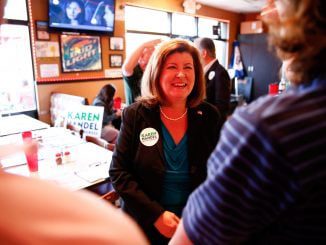FARMVILLE — When it was incorporated in 1872, the Town of Farmville was an area of vast land ripe for tobacco production in the heart of Eastern North Carolina. Tobacco sales, processing and warehousing cultivated a nature of growth and stability through the 1960s.
“Seventy-five years ago, Farmville was a well-to-do town, but with the ’90s collapse of the tobacco industry, that hit us hard,” said Bert Smith.
“The downtown is the front door to our community. You can recruit industry all day long, but if your downtown looks horrible and your town doesn’t present itself well, then they may put the factory here but choose to live somewhere else. That doesn’t improve your community beyond a certain point. We really want to focus on the whole picture, but a somewhat dilapidated downtown has been our weak link. An industry doesn’t come in and say, ‘take me to your strip mall.’ They ask to see your downtown,” added Todd Edwards.
Farmville’s weak link of a dilapidated downtown has steadily diminished. What’s left behind is a town on the rise, a community where many young professionals are moving, a vibrant downtown full of color, visitors in every business and more waiting to unfold.
How does a town rebound after a steady loss? Cue the four businessmen who helped spawn an economic upturn that has set the Town of Farmville as a go-to community in the East.
The Farmville Group, a grassroots organization of sorts, comprised of four men who meet once a week to discuss how best to motive and improve their community, are making huge changes in the way people see Farmville.
The businessmen Smith, former owner of the Plank Road Steakhouse; Edwards, owner of Edwards Construction; Randy Walters, owner of Farmville Furniture Co.; and Jamin Dixon, owner of Dixon and Assoc. Real Estate began meeting four years ago to discuss ways to improve their community. From there, their labor became fruitful.
“We are four guys who got together and knew we needed to do something for economic development. In Eastern North Carolina, generally downtown areas are not part of economic development. Downtowns have been notoriously eliminated and omitted from that program,” said Walters.
To start, letters of encouragement were sent out to people in the community identifying projects and ideas. Suggestions that included painting buildings or adding awnings over doors.
“It’s a ‘can-do attitude’ from everyone. We are determined to make the good things better and the bad things good,” said Dixon. “It started off positive with encouraging people to make things a little bit better than what they were already doing and then this took off from there.”
“We came up with the slogan ‘Only good things happen in Farmville,'” said Smith. “We didn’t mean to limit our work to just downtown, but downtown became such a focal point. If riding from here to the coast or here to anywhere, we didn’t want to see people riding through a downtown that was bleak with little business. We didn’t want that happening to our downtown so it was time to make good things happen however we could.”
And good things did happen.
There’s been the restoration of city signs and historical markers. Murals, such as the popular renderings of a chicken and pig, are painted on the sides of buildings. Modern houses are mixed with historic homes and both are full of charm. Shop keepers have decorated their windows, the streets are clean, the buildings are thriving and there are more businesses on the way.
Public money has not been available for these projects. Financial support, time and in-kind gifts have been generously donated by the community. The town government works alongside the community to aid as they can.
“Farmville is a unique town that sits in a great geographical location. We knew we did not have public money to make most of these changes happen. Farmville is a uniquely generous community. We have been given real estate, a private trust and fine contributions that have made all this happen,” said Walters.
The most unique concept is the Glass Station, a partnership with East Carolina University’s College of Fine Arts, which has students and faculty working together in an old Gulf gas station that was converted into a glass blowing studio. ECU pays approximately $14,000 annually to lease the property and hold classes. The public is often invited to watch the glass blowing projects take place.
A former Chrysler dealership complete with bricked walls and wood beams is now an event center. A former farmer’s market and hardware company has been converted into the home of an eSTEAM lab (entrepreneurship, science, technology, engineering, art, and math).
“We’ve had a hundred different spin offs from just a few ideas,” said Edwards.
“We’ve had businesses call us and ask for us to find them a spot in downtown,” added Dixon.
Word is getting out about Farmville and the town is waiting to welcome neighbors and visitors alike. The Farmville Group is actively looking for individuals or businesses who wish to open a ladies clothing shop, boutique hotel, hardware store, child care facility, food and beverage restaurant, and a small batch distillery or microbrewery.
“I’m proud of the town I grew up in,” said Dixon. “The work everyone is doing now will benefit the generations to come.”




